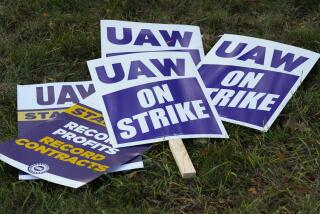Eastern German Strike Spreads to West
- Share via
BERLIN — A week-old strike in eastern Germany’s metalworking industry spread for the first time to the west Monday, with 20,000 workers at a Mercedes-Benz assembly plant in the southwestern city of Sindelfingen stopping work briefly to demonstrate solidarity with their eastern colleagues.
The stoppage came as organizers from the giant metalworkers union IG Metall announced plans for wider token stoppages throughout the western region Wednesday.
“There will be disruptions from Emden to Munich,” declared IG Metall spokeswoman Dagmar Opoczynski, referring to cities on the North Sea coast and in southern Germany, respectively.
While Opoczynski declined to predict how many might participate, other union officials have said they expect more than 100,000 western workers to attend midday rallies in support of the strike.
Meanwhile, workers in the three remaining eastern states voted Monday on whether to join the strike, the first in eastern Germany in more than 60 years. A widely expected positive vote would extend the industrial action throughout the eastern region, potentially affecting about 420,000 workers in the metalworking and steel industries. The figure constitutes about 10% of the east’s total work force.
The strike was triggered when the national employers association, Gesamtmetall, last month unilaterally suspended a four-year contract signed in 1991 that set a timetable for equalizing wage levels and fringe benefits between eastern and western German workers.
The contract, agreed to when most believed that eastern German worker productivity would rapidly achieve western levels, required eastern employers to increase wages by 26% from last April 1, a move management now insists would drive many companies into bankruptcy.
Despite optimistic initial forecasts, productivity levels in the former Communist region remain at around one-third those in the western part of the country. With a jobless rate of about 30%, the eastern economy is also depressed.
While union executives say they now accept that the present timetable is unrealistic, they still demand a commitment to equalize wages and a date to go with it.
“We’re prepared to delay, but we need to give our people some fixed dates for achieving this goal,” Opoczynski said.
Employers claim they have learned from the present strike that it is irresponsible to commit themselves to specific dates years ahead. They are prepared to go no further than agreeing to a set of non-binding goals on the sensitive issue of wage equalization.
Despite these differences, the absence of new talks and indications that the strike could quickly spread further, employers remained doggedly optimistic that a settlement could come this week.
“We believe they (trade union leaders) know they can’t get much more and will agree to talk,” employers spokesman Werner Riek said.
More to Read
Sign up for Essential California
The most important California stories and recommendations in your inbox every morning.
You may occasionally receive promotional content from the Los Angeles Times.










